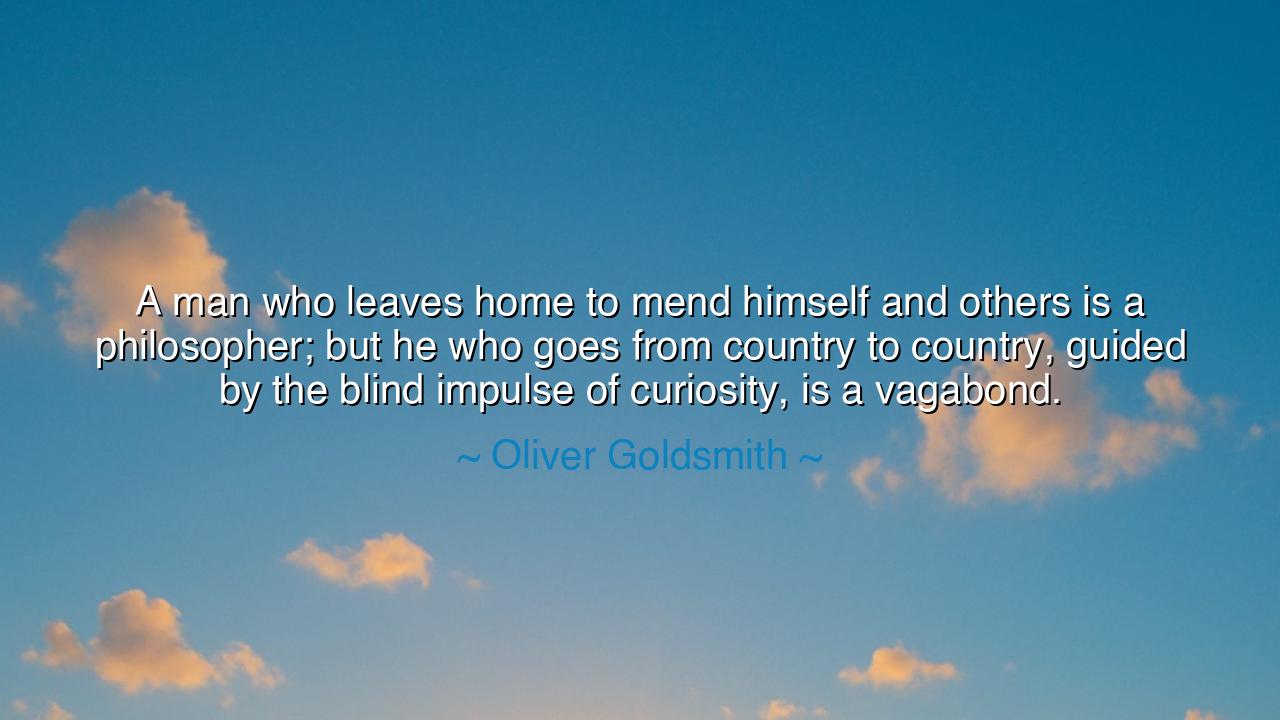
A man who leaves home to mend himself and others is a
A man who leaves home to mend himself and others is a philosopher; but he who goes from country to country, guided by the blind impulse of curiosity, is a vagabond.






Hear the solemn wisdom of Oliver Goldsmith: “A man who leaves home to mend himself and others is a philosopher; but he who goes from country to country, guided by the blind impulse of curiosity, is a vagabond.” These words divide the wanderer into two kinds: the seeker of wisdom and the drifter without purpose. For in every journey there lies a question—are you walking to heal, to grow, to serve, or are you merely fleeing, carried about by restless winds? Goldsmith teaches us that it is not the motion of the feet that defines a man, but the purpose of his steps.
The philosopher is not one who simply reads or speaks, but one who travels with intent—to learn from the world, to strengthen his soul, and to offer what he has gained to others. His leaving of home is not an escape, but a pilgrimage. He departs not in disdain for his own hearth, but in hope of returning with treasures of knowledge and healing. Such men walk the earth as bridges, carrying wisdom across borders, uniting peoples by what they have seen and understood.
The vagabond, by contrast, drifts without compass. He is pulled not by purpose but by the impulse of curiosity. He desires not to learn but to consume; not to heal but to amuse himself. He fills his eyes with sights, but his heart remains empty. He crosses countries, yet never crosses into the deeper realm of wisdom. His wandering is a circle that returns him to the same ignorance with which he began. Goldsmith condemns such life as wasted motion, a shadow of true travel.
History offers clear examples of both paths. Consider Socrates, who though he rarely left Athens, embodied the spirit of the true philosopher: every dialogue a journey, every conversation a path toward truth and self-examination. By contrast, think of emperors like Nero, who roamed from city to city in pursuit of spectacle, leaving ruin behind and gathering nothing but further decay of the soul. One walked with purpose, the other drifted in vanity.
Or look to the life of Buddha, who left his palace not for pleasure but to find the cure for suffering. His journey across India was not the flight of a vagabond, but the pilgrimage of a philosopher, seeking to mend both himself and others. Out of his steps arose a teaching that endures across millennia. Such is the power of purposeful wandering: it builds legacies, not empty tales.
Yet Goldsmith’s words also warn us against a subtle danger. For curiosity in itself is no sin—it is the spark of learning. But when curiosity is blind, unanchored by discipline or aim, it becomes mere distraction. True travel must be tempered with reflection; the eyes must lead to the heart, and the heart must guide the mind. Without this union, movement is wasted, and the traveler becomes but a restless vagabond.
The lesson for us is this: before we leave home, we must ask why. Do we seek to better ourselves, to bring back wisdom, to serve those we love, or are we fleeing restlessly, afraid of stillness? Let our journeys be pilgrimages, not escapes. Let our footsteps be measured not by distance alone, but by growth, by service, by the mending of what is broken in ourselves and in others.
Practically, this means: travel with intention. Keep a journal not only of what you see, but of what you learn. Seek mentors in foreign lands, and bring back teachings for your community. Ask not only what the journey gives you, but what you will give through it. Then, and only then, will your leaving of home be noble, and your return be fruitful. For to wander without aim is to waste one’s life, but to walk with purpose is to live as a true philosopher.






AAdministratorAdministrator
Welcome, honored guests. Please leave a comment, we will respond soon